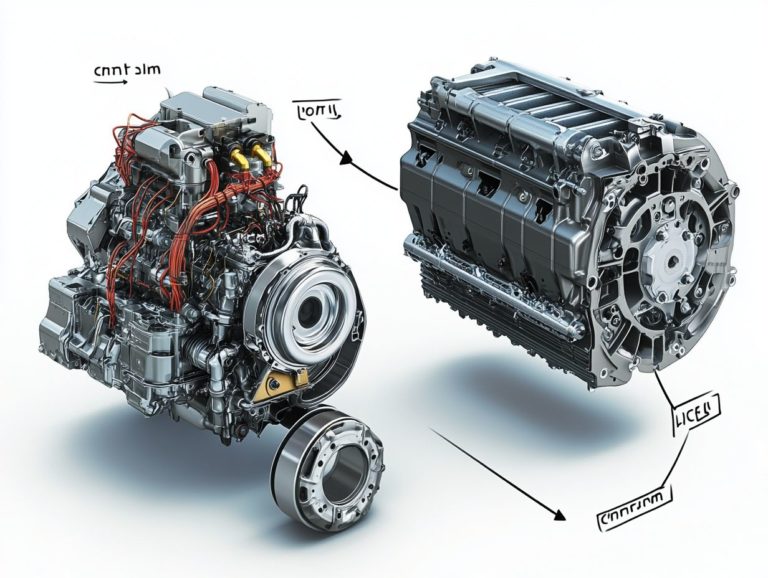Feature Comparison: Sedans vs. SUVs
Choosing a vehicle can feel like navigating a labyrinth, especially when you’re deciding between sedans and SUVs.
Each option comes with its own distinct advantages, from cost and performance to interior space and safety features. This article delves into the key differences, providing you with a clear understanding of the financial considerations, driving experiences, and practical aspects of both categories.
Whether your priority is efficiency or ample room for passengers and cargo, you’ll discover essential insights that will empower your decision-making process.
Contents
Key Takeaways:
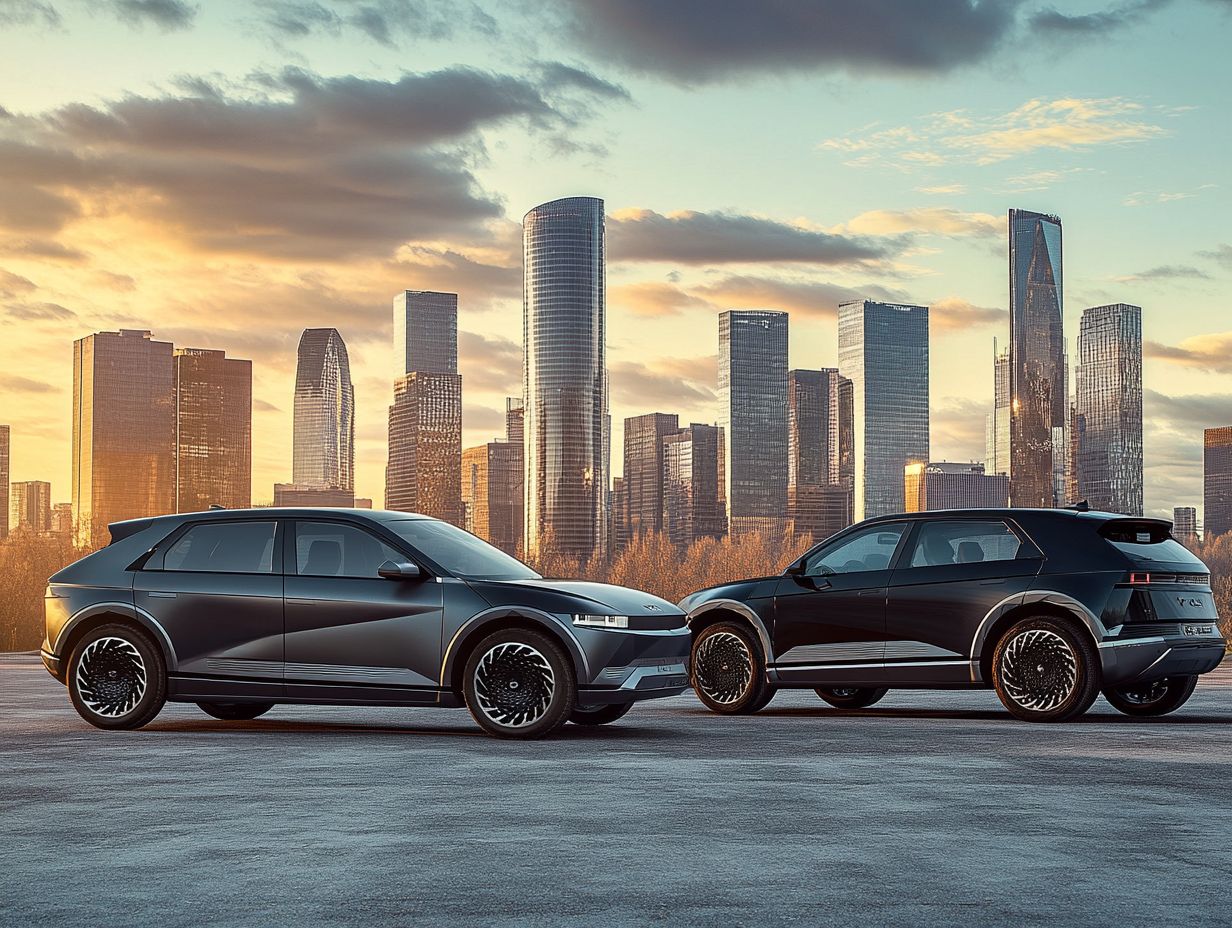
- Sedans generally have lower purchase prices and maintenance costs compared to SUVs, making them a more budget-friendly option.
- SUVs usually have more powerful engines and can be more fuel-efficient, but sedans offer better handling and maneuverability.
- When deciding between a sedan and SUV, consider factors such as seating capacity, cargo space, safety ratings, and environmental impact to determine which better suits your needs.
Overview of Sedans and SUVs
In today s automotive landscape, you find yourself at a crossroads between sedans and SUVs, each presenting unique advantages that align with your driving habits and lifestyle needs.
Sedans, with their sleek, compact design and impressive fuel efficiency, are perfect companions for urban driving. For those interested in exploring options, luxury sedans: a comparison of top models offers insights into the best choices available. SUVs boast higher ground clearance, greater towing capacity, and roomy interiors, making them appealing for families and adventure seekers.
Understanding these key differences will make your car-buying journey easier!
Definition and Characteristics
Sedans are a testament to sleek design and efficiency, typically providing enhanced fuel economy and comfort for your daily commute. In contrast, SUVs for city driving offer a higher seat position and greater versatility for passenger and cargo space.
Take the Honda Accord, for example; it perfectly embodies the sedan’s appeal with its smooth ride, spacious interior, and the latest safety features. It’s no wonder it s a go-to choice for families and professionals alike.
On the flip side, the Toyota RAV4 distinguishes itself in the SUV realm with its robust design and generous cargo space, making it ideal for adventurous weekend getaways.
Both vehicles deliver exceptional performance. Sedans often shine in handling and fuel efficiency, while SUVs prioritize space, allowing you to transport both passengers and gear easily. For those considering family options, a price comparison of family SUVs vs. minivans can help you understand which type caters to distinct comfort features, influencing how they meet the diverse needs of modern drivers like yourself.
Cost Comparison
When contemplating a new vehicle, it s crucial for you to grasp the cost comparison between sedans and SUVs. This consideration goes beyond just the initial purchase price; it also includes ongoing maintenance expenses and insurance rates, which can significantly impact your budget over time.
Purchase Price and Maintenance Costs
The purchase price of a vehicle can vary significantly between sedans and SUVs. Sedans generally present lower base prices and often have reduced maintenance costs compared to their larger SUV counterparts.
For example, the Honda Accord typically starts around $26,000, in contrast to the Honda CR-V, which begins at about $30,000. The financial difference is quite evident. Maintenance costs can also vary; the Accord averages around $400 annually, while the CR-V s expenses might soar to $500 or more.
Insurance premiums further contribute to the overall cost, usually reflecting higher rates for SUVs due to their greater likelihood of incurring higher repair costs and potential theft rates.
By carefully evaluating these factors, you can make informed decisions that align with your budget plans.
Don’t wait! Discover which vehicle fits your lifestyle today.
Performance Differences
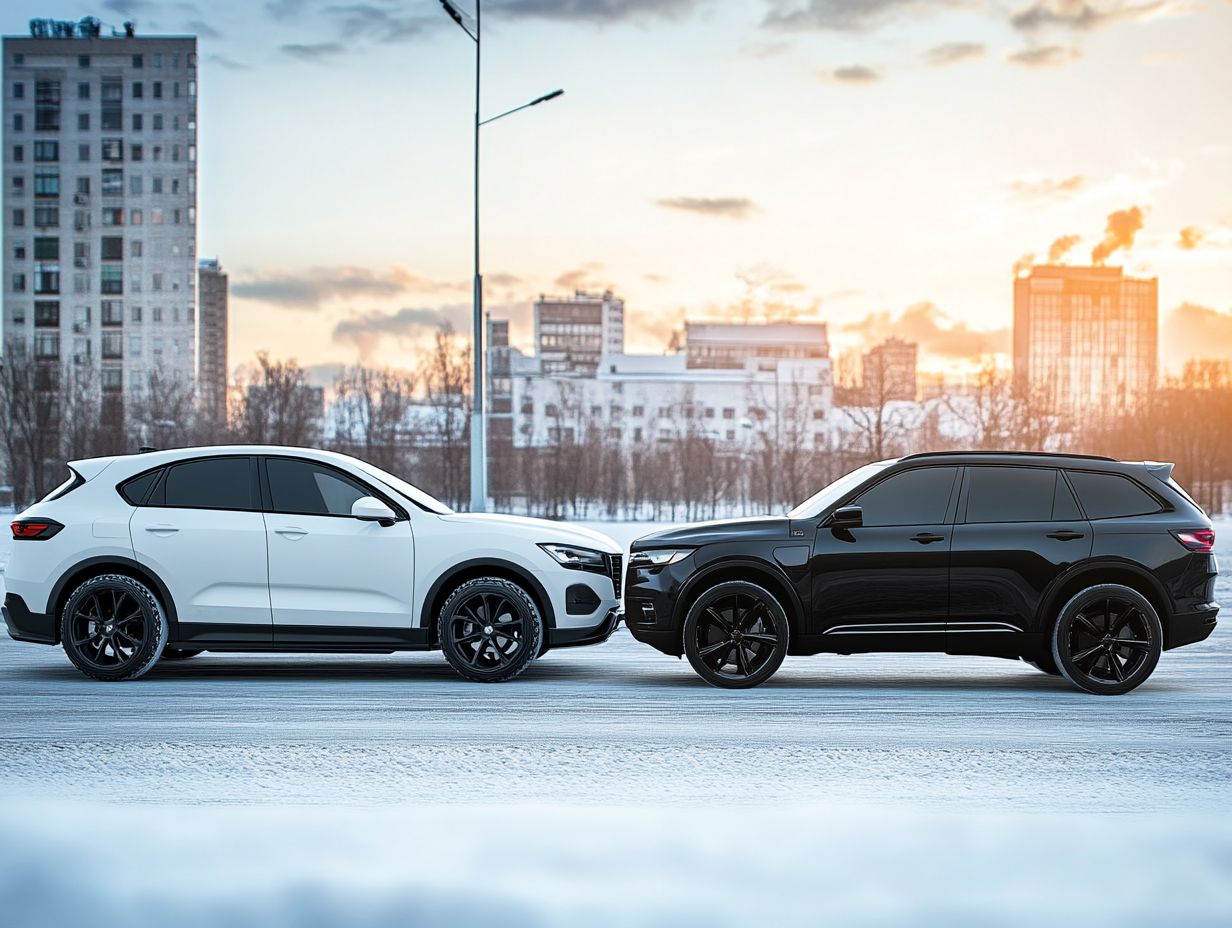
Performance differences between sedans and SUVs stem from their unique designs. Sedans excel in fuel efficiency and speed, making them ideal for nimble handling on the road.
SUVs, on the other hand, are built for power and towing capacity. They cater to a range of driving experiences whether you want the swift elegance of a sedan or the robust versatility of an SUV.
Engine Power and Fuel Efficiency
Sedans usually come with smaller engines, which boost fuel efficiency. Many SUVs also offer hybrid and electric engines for enhanced performance and lower emissions.
This variety allows you to tailor your choice to your needs. If you prefer traditional driving, gasoline engines provide reliable power.
For a greener option, the Toyota RAV4 Hybrid blends efficiency with capability. It significantly improves fuel economy while reducing emissions.
Hybrids are not just about saving on fuel costs; they also support sustainability. Your engine choice shapes your running costs and ecological footprint.
Interior Space and Features
Sedans and SUVs differ in seating capacity and cargo room. SUVs often offer more space, making them well-suited for families and road trips.
Seating Capacity and Cargo Room
Seating in SUVs caters to larger groups with multiple rows, while sedans typically accommodate up to five people. For instance, the Honda CR-V seats five to seven comfortably, ideal for family outings.
In contrast, the Toyota Camry offers a cozy space for five, but has a smaller trunk, which may limit its utility for larger items.
Consider the Chevrolet Tahoe, a full-size SUV that seats up to nine and has ample cargo capacity. This makes it perfect for large families.
Understanding these differences can help you choose between an SUV and a sedan based on your daily needs, like commuting or traveling.
Why Safety Matters: Ratings and Features
Safety is a top concern for any car buyer. Both sedans and SUVs offer a range of safety ratings and features from respected organizations.
These ratings reflect their effectiveness in crash protection and advanced driver assistance technologies, ensuring you make a well-informed choice.
Crash Test Results and Advanced Safety Technologies
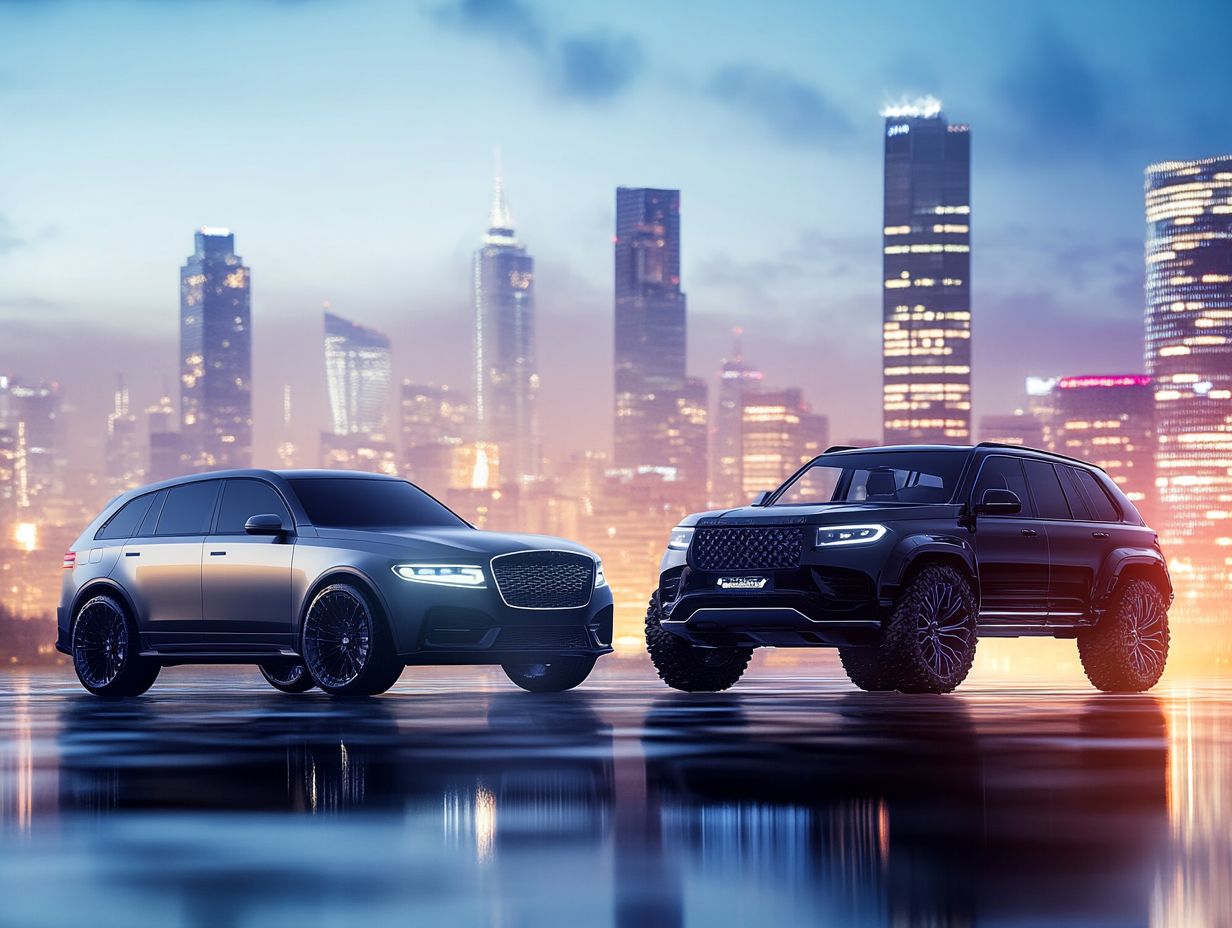
Crash test results from the Insurance Institute for Highway Safety and the National Highway Traffic Safety Administration offer you essential insights into the safety of both sedans and SUVs. These results highlight new safety features that are increasingly becoming standard across various vehicle types.
These evaluations show how features like automatic emergency braking, lane-keeping assist, and advanced airbag systems can significantly elevate a vehicle’s safety profile. As you learn more about these advancements, you’re likely to prioritize models that excel in safety ratings.
With a growing focus on passenger protection, you now demand vehicles equipped with the latest safety technologies, which directly influences your purchasing decisions.
By grasping the crucial role these technologies play in real-world scenarios, you’re enabled to make choices that align with your safety preferences.
Environmental Impact
The environmental impact of vehicles has become a significant consideration for discerning buyers like you. Sedans typically showcase lower emissions and enhanced fuel efficiency compared to larger SUVs.
However, advancements in hybrid and electric vehicle technologies are steadily narrowing that divide, offering you increasingly sustainable options without compromising on performance.
Emissions and Eco-Friendliness
Emissions from vehicles are at the forefront of environmental conversations. As you explore your options, you ll find eco-friendliness emerging as a crucial factor. More consumers like you are gravitating toward hybrid and electric vehicles, whether for sedans or SUVs.
This shift toward sustainable automotive choices reflects a heightened awareness of climate change and underscores the urgent need for cleaner alternatives to traditional gasoline-powered models. By opting for hybrid and electric vehicles, you play a significant role in minimizing harmful emissions, directly contributing to reducing air pollution and your carbon footprint.
Many of these eco-friendly options come with advanced technology designed to enhance both efficiency and performance, making them increasingly attractive to a wider audience. As manufacturers continue to innovate, the advantages of choosing greener vehicles like lower running costs and enticing government incentives become clearer, paving the way for a more sustainable future in the industry.
Which is Right for You?
When choosing between a sedan and an SUV, several key factors should guide your decision. Your driving habits, comfort preferences, budget, and passenger capacity requirements all play a significant role in finding the ideal vehicle that complements your lifestyle.
Taking the time to evaluate these elements will lead you to make a well-informed decision that suits your needs perfectly.
Factors to Consider in Choosing Between a Sedan and SUV
When weighing the choice between a sedan and an SUV, consider your driving habits, comfort preferences, budget, and the features that are most important to you.
If navigating daily city traffic is your main concern, a sedan typically shines with its superior fuel efficiency and compact size, making parking a breeze. On the flip side, if you lead an active lifestyle or have a larger family, the spacious interior and enhanced storage capacity of an SUV may be more appealing.
Think about how often you go on long road trips compared to city driving. The comfort features found in higher-end SUVs like cutting-edge technology and premium sound systems can significantly elevate your travel experience.
Ultimately, evaluating your personal needs against the distinct advantages of each type will guide you toward the perfect choice.
Frequently Asked Questions
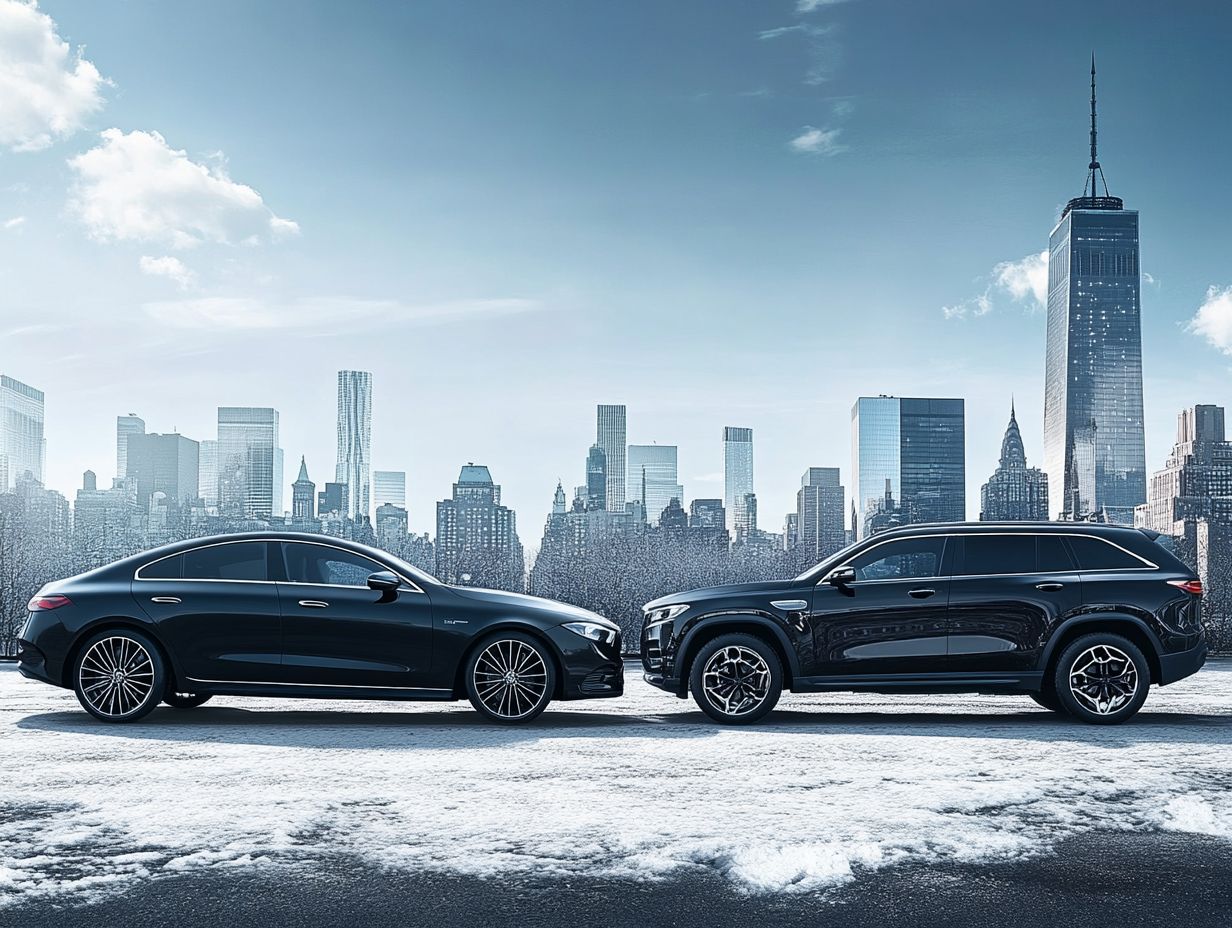
For more information on vehicle safety and eco-friendliness, explore our related articles!
What are the main differences between sedans and SUVs?
Sedans are smaller and more fuel-efficient than SUVs. In contrast, SUVs are larger and provide more space for passengers and cargo, making it important to consider price analysis: sedan vs. SUV in 2024 when deciding which vehicle suits your needs.
Which type of vehicle is better for families?
For smaller families, sedans work well, especially with 1-2 children. If you have 3 or more kids or frequently transport large items, SUVs are the better choice.
Do sedans and SUVs have different safety features?
Both can feature safety equipment like airbags and stability control. However, SUVs often have extra features like blind spot monitoring and lane departure warnings because of their size.
Are there differences in the driving experience?
Sedans usually offer a smoother and more comfortable ride thanks to their lower height and lighter weight. SUVs often feel more stable and have better traction in tough conditions.
Which type of vehicle is more fuel-efficient?
Generally, sedans win in fuel efficiency due to their lighter weight and smaller engines. Yet, advancements mean some SUVs now boast impressive mileage, so always compare models.
Do sedans and SUVs have similar pricing?
Sedans typically start at a lower price than SUVs. However, prices can vary widely based on the brand, model, and features, with SUVs ranging from budget to luxury.




